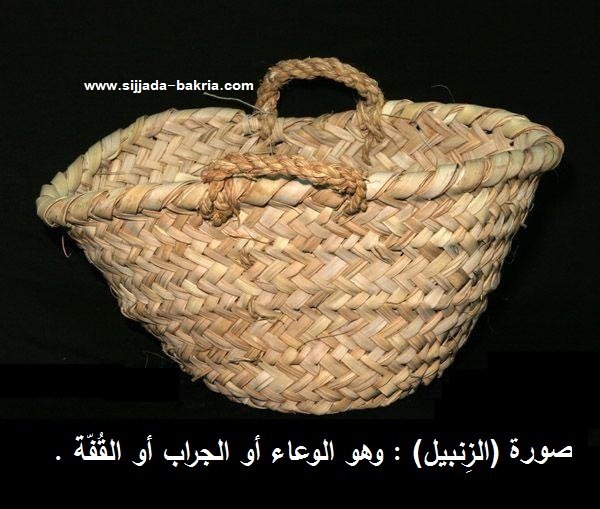‘Ala’ ad-Din Al-Zinbili Al-Jamali Al-Rumi
 An image of a zinbil, which may refer to a container, knapsack, or basket.
An image of a zinbil, which may refer to a container, knapsack, or basket.
‘Ala’ ad-Din Al-Zinbili Al-Jamali Al-Rumi (1): The Honorable Mawla, Shaykh Al-Islam ‘Ala’ ad-Din Ali Bin Ahmed Bin Muhammad Al-Jamali Al-Rumi the Hanafi, was of the descendants of Jamaluddin Muhammad Al-Aqsara’i Al-Rumi, whose ancestry could be traced back to the great scholar Fakhr Al-Din Al-Razi, a descendant of Abu Bakr Al-Siddiq whose ancestry could be traced back to the tribe of Quraysh.
Known as one of the honorable Hanafi jurists of Anatolia, ‘Ala’ ad-Din Al-Zinbili held the position of Grand Mufti of Constantinople during the reigns of three different sultans: Bayezid II, Selim I, and Suleiman the Magnificent (also known as Suleiman the Lawgiver).
During his youth, ‘Ala’ ad-Din Al-Zinbili received knowledge from Mawla ‘Ala’ ad-Din Ali Bin Hamzah Al-Qaramani and memorized Mukhtasar Al-Quduri and the Manthuma of Al-Nasafi under his supervision. He then went to Constantinople and received knowledge from Mawla Khusraw, who sent him to Musleh Al-Din Bin Husam, giving the excuse that he was preoccupied with his fatwas, and that Mawla Musleh Al-Din would devote more time to his education than him. ‘Ala’ ad-Din thus went to Mawla Musleh Al-Din while he was the head-teacher of Sultaniyah Prusa and learned the intellectual sciences and Shari’ah from him. He also lectured for him in the above-mentioned school. He married his daughter to him, and they had children together. He was then put in charge of a school for a salary of thirty dirhams, after which he became a teacher in Edirne. When Vizier Al-Qaramani eliminated his job due to his strong friendship with Sinan, he left teaching and went to serve Sheikh Wafa—although other sources indicate that it may have been Sheikh Mas’ud Al-Edirnawi whom he went to serve.
When Sultan Bayezid ascended the throne, he had ‘Ala’ ad-Din go to Amasya to teach and issue fatwas. He then put him in charge of Muradiat Prusa (Sultan Murad Khan Al-Ghazi School in the city of Prusa). ‘Ala’ ad-Din then left that school and went to Amasya to visit his cousin, “Al-‘Arif Billah” Sheikh Muhi Al-Din Muhammad Al-Jamali. Sultan Bayezid Khan then put him in charge of a “Bayezidi” school in İznik, paying him a wage of fifty dirhams per day.
After this, Sultan Bayezid Khan put ‘Ala’ ad-Din in charge of the Sultaniyah Prusa school, and when the sultan later built his Amasya school, he appointed him head-teacher there and gave him the authority to issue fatwas there as well. For some reason, ‘Ala’ ad-Din Al-Zinbili abandoned this work and went to Constantinople instead. The sultan disliked this and did not communicate with ‘Ala’ ad-Din for some time. After a while, however, the sultan experienced disturbances in his sleep after hearing ‘Ala’ ad-Din speak in a vision or dream. He shared the contents of the vision with ‘Ala’ ad-Din and subsequently put him in charge of the Sultaniyah school, where he taught for a long time.
‘Ala’ ad-Din then headed to Egypt with the intention of performing the Hajj pilgrimage, but it wasn’t possible to perform the Hajj that year due to some strife that took place in the honorable city of Makkah. ‘Ala’ ad-Din thus remained in Egypt for one year before performing the Hajj and then returning to Anatolia. Mawla Afdhal Al-Din (or Hamid Al-Din), the Mufti of the Royal Court, died while he was away, so the Sultan ordered the resident teachers and scholars there to write fatwas until ‘Ala’ ad-Din came back. He then gave him the position of Mufti for a wage of a hundred dirhams. When he later built a school, he appointed him there as well for a wage of fifty dirhams. ‘Ala’ ad-Din remained in these positions until he died.
‘Ala’ ad-Din Al-Zinbili used to spend all of his time in recitation of the Qur’an and worship, also teaching, issuing fatwas, and praying five times a day in congregation. He was generous, humble, and had excellent morals, never saying anything bad about anyone. He used to close the door of his home and sit in a room of his alone. Papers with fatwa-questions would be delivered to him, and he would write his responses on them and send them back. He used to do this in isolation so that he would not see the questioners and favor anyone in his fatwas.
As for ‘Ala’ ad-Din’s nickname (Al-Zinbili), the authors of both Al-Shaqa’iq Al-Nu’maniyah and Sullam Al-Wusul mentioned that Mawla ‘Ala’ ad-Din Al-Jamali used to sit atop his home and lower a zinbil (basket) down the side of the house. The fatwa-seekers would throw their fatwa-questions in the basket and shake it. He would then pull the basket up and write his responses quickly so that no one would have to wait too long for a fatwa. Perhaps this is why he was nicknamed Al-Zinbili!
*A zinbil (pl. zinabil) is a large container, knapsack, or basket. In dictionaries, it appears as both zanbil (with a fat-ha) and zinbil (with a kasra) to denote a basket or container made of palm fronds. It also appears as zabil (pl. zubul) to mean “basket.” Al-Jawhari said: [The word] al-zabil is well-known, and if you add a kasra to it, then a shadda is also added, and you should say “az-zib-bil” or “az-zin-bil,” because [of the linguistic pattern it follows]. In Mukhtar Al-Sihah, it says: Az-zabil means “basket,” and if you say az-zibil (with a kasra), a shadda is added, and you say “az-zib-bil” or “az-zin-bil” (2).
Among Mawla ‘Ala’ ad-Din Al-Zinbili’s most important attributes was his keenness to enjoin the good and forbid the evil, always speaking the truth, unafraid to confront the sultan and other high-ranking officials when necessary. Related to this, it was reported that Sultan Selim ordered the execution of 150 treasury keepers, so Mawla ‘Ala’ ad-Din Al-Zinbili went to the Royal Court, even though it was not customary at the time for a mufti to appear at the Royal Court unless the matter was very serious. When ‘Ala’ ad-Din entered, those present expressed surprise and asked: “What matter has caused the mawla to come?”
In response, ‘Ala’ ad-Din said: “I wish to meet with the sultan, as I need to have a word with him.” They brought the matter before the sultan, and the sultan ordered ‘Ala’ ad-Din to enter alone—so he entered, greeted the sultan, sat down, and said: “The job of those entrusted with the matter of fatwa is to preserve the Sultan’s Hereafter, and I heard that you have ordered the execution of 150 men from the Royal Court. Their execution is not legally permissible according to the laws of Shari’ah.”
Sultan Selim (who was known for his bad temper) became angry and told him: “Do not interfere with the affairs of the sultanate. That is not part of your job.”
‘Ala’ ad-Din responded: “But I do interfere with the matter of your Hereafter, something which is part of my job—so if you pardon (the men), you will be saved. Otherwise, you will have a great punishment.”
Upon hearing this, the sultan’s anger dissipated, and he pardoned all of the men. Mawla ‘Ala’ ad-Din then continued speaking with the sultan for some time and requested that he also return the men’s positions to them, which he did.
In another incident, Sultan Selim Khan went to the city of Edirne, accompanied by Mawla ‘Ala’ ad-Din. On the way, ‘Ala’ ad-Din encountered 400 men tied up with ropes, so he inquired regarding their situation—and they said that they had disobeyed the orders of the sultan and purchased silk, which the sultan had banned. So the mawla went to the Sultan, who was riding on his mount at the time, and spoke to him regarding the men, saying: “It is not permissible to kill them.”
Upon hearing this, the sultan again expressed anger and said: “O Mawla, would it not be permissible to kill two thirds of the world’s people in order for everyone else to live in order?”
“Yes,” he replied, “But what if it led to great disorder?”
“Is there any disorder greater than violating an order?” asked the sultan.
“These men did not violate your orders,” replied the mawla. “You appointed trustees regarding the silk, and permission was thus granted indirectly.”
The sultan said: “The affairs of the sultanate are not part of your job!”
“This is a matter of the Hereafter,” replied ‘Ala’ ad-Din, “So intervening in this matter is part of my job.” After this, Mawla ‘Ala’ ad-Din left without bidding the sultan farewell, so Sultan Selim Khan became acutely angry, stopping his horse for a long time as the people in front of him and behind him came to a standstill, bewildered by everything that had transpired.
Later, when Sultan Selim Khan arrived home, he pardoned everyone—and upon his arrival to the city of Edirne, he sent an order to Mawla ‘Ala’ ad-Din, stating: I hereby appoint you head-judge of the army, and you will remain in both positions as I am now certain that you say what is just.
Mawla ‘Ala’ ad-Din composed a response to the sultan, saying: I have received your letter, may Almighty Allah bless and sustain you. You have ordered me to the judiciary, and I am ready to comply with your order—except that I have a covenant with Allah, which is that the phrase “I ruled” will never pass through my lips.
Sultan Selim Khan greatly admired Mawla ‘Ala’ ad-Din for his willingness to eschew power, prestige, and wealth in favor of preserving his faith. He sent him 500 dinars, which he accepted. Sultan Selim also increased ‘Ala’ ad-Din’s salary by another 50 dirhams, bringing his total salary to 200 Ottoman dirhams.
Among Mawla ‘Ala’ ad-Din’s authored works were Mukhtarat Al-Masa’il wa Sharhiha (on the topic of fatwa), Mukhtar Al-Hidaya wa Sharhihi (on the applications of Islamic law), Adab Al-Awsia’ (on Hanafi jurisprudence), and Akhlaq Al-Jamali, which he wrote for Ottoman Sultan Bayezid Khan II.
Mawla ‘Ala’ ad-Din Zinbili Al-Jamali died in Constantinople in 932 AH (1526 AD), during the reign of Sultan Suleiman the Lawgiver. The author of Sullam Al-Wusul said that his death took place in 931 AH, but 932 is thought to be more accurate.
Prepared by: Ahmed Abdul-Nabi Farghal Al-De’abassi Al-Bakri
20 Dhul Hijjah 1438 AH / September 11, 2017 AD
(1) Al-Shaqa’iq Al-Nu’maniyah fi ‘Ulama’ Al-Dawlah Al-‘Uthmaniyah pp. 173-176, Shatharat al-Thahab Fi Akhbar Min Dahab 10/ 257-258, Al-Kawakib Al-Sa’ira bi-Ayan Al-Mi’ah Al-‘Ashirah 1/ 268-269, Sullam Al-Wusul ila Tabaqat Al-Fuhul 2/ 350, Hadiyyat Al-‘Arifin 1/ 742, Mu’jam Al-Mu’allifin 7/ 25, Al-A’lam, by Al-Zarkali 4/ 258
(2) Mukhtar Al-Sihah pg. 134, Lisan Al-Arab 11/ 301, Takmilat Al-Mu’jam Al-‘Arabiyyah 5/ 286
